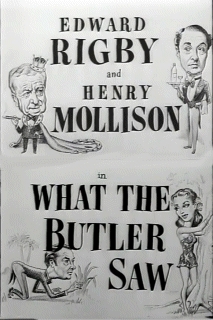| What the Butler Saw | |
|---|---|
 | |
| Directed by | Godfrey Grayson |
| Screenplay by | A.R. Rawlinson E.J. Mason |
| Based on | An original story by Roger and Donald Good |
| Produced by | Anthony Hinds |
| Starring | Edward Rigby Henry Mollison Mercy Haystead Michael Ward |
| Cinematography | Walter J. Harvey (as Walter Harvey) |
| Edited by | James Needs |
Production company | |
| Distributed by | Exclusive Films |
Release date |
|
Running time | 61 mins |
| Country | United Kingdom |
| Language | English |
What the Butler Saw is a 1950 British second feature ('B') [2] comedy film directed by Godfrey Grayson and starring Edward Rigby, Henry Mollison and Mercy Haystead. [3] [4] The screenplay was by A.R. Rawlinson and E.J. Mason, from an original story by Roger and Donald Good. It was made by Hammer Films. [5] Production began on Jan. 9, 1950. It was trade shown on June 22, 1950 at the Rialto, and was released in September 1950. The film did not do well at the box office, and, although once considered a lost film, [6] it is now freely available on the internet and has been shown in the UK by Talking Pictures TV.